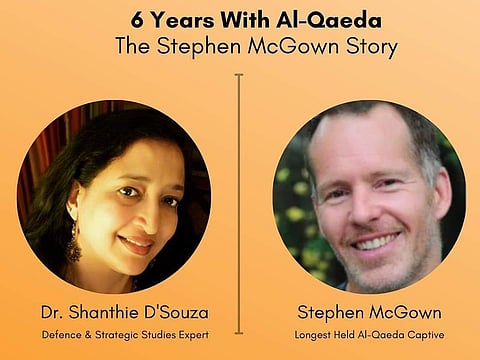

Stephen McGowan, a South African national became Al-Qaeda's longest-held captive — he was a hostage for five years eight months after being captured in 2011 in Africa's Mali and finally released in 2017. But he did not lose hope. He used empathy to deal with the situation and he says that being nice and empathetic to them might have helped him live. Stephen was speaking at the International Kindness Festival 2021 about the role of empathy as a survival tool.
Dr Shanthie Mariet D'Souza, a Defence and Strategic Studies Expert, who has written extensively on counter-terrorism and has worked in Afghanistan for over a decade in different capacities, joined Stephen in the conversation. Dr D'Souza said that prevention is an option that is not explored as much when it comes to counter-terrorism. "Empathy is very important here but it has not been used very well. I have met people in Afghanistan who have surrendered and come back. They did not get empathy or acceptance from society. That's why they tend to get back," she said.
"I was just a tourist. Prior to being kidnapped I was interested in Islam but never got into it. it was an incredibly long experience. When I was kidnapped, Al Queda was in its initial days. But during my stay, I have seen them grow. I saw an 8-year-old, the youngest member there grow up. I have seen kids grow up into young men. I was saturated with the Al Qaeda world. I had no communication with the rest of the world. I had a British passport. I had dual citizenship — I was a South African for 36 years and a British-South African for three months when I was kidnapped. This put me on top of the food chain. We had two other prisoners, one Dutch and another one who was Swedish. At first, they would consider me less than an animal. You could at least slaughter and eat an animal. I was below that. The head of the group in Mali would look right through me. He would have a little boy sitting next to him and he would talk to me through him even though I was just two metres away. He would treat me like I did not even exist," said Stephen.
But there was a turning point — six to eight months into the desert. "When there is a gun to your head and you count the seconds you realise what is important to you. I realised I needed to be liked to stay alive. Al Qaeda, barring the top leaders, were teenagers who fell into Al Qaeda. The Mali government treated them badly. The French had a presence there but they were seen as looters. The Mali government had killed their parents and they had nowhere to go to. They were there because of the guns and the excitement. I could empathise with them. But it was difficult. They took five years and eight months from me," said Stephen as he went on to describe an argument he had with a fellow prisoner. "He asked me why I was being friendly even though I was a prisoner. I told him that he was 100 per cent correct. But if you are angry every day and sit in your tent and grit your teeth in anger it will change you as a person. You would go home a different man. I did not want them to take away who I am, what made me smile or made my eyes shine," said Stephen.
Empathy was not just a front he put up but it came naturally to Stephen, "I wanted to make relationships. if they were going to kill me then they would kill me but if they were not killing me I wanted to make the most of my stay there. Understanding the people added colour to the situation," he added.
